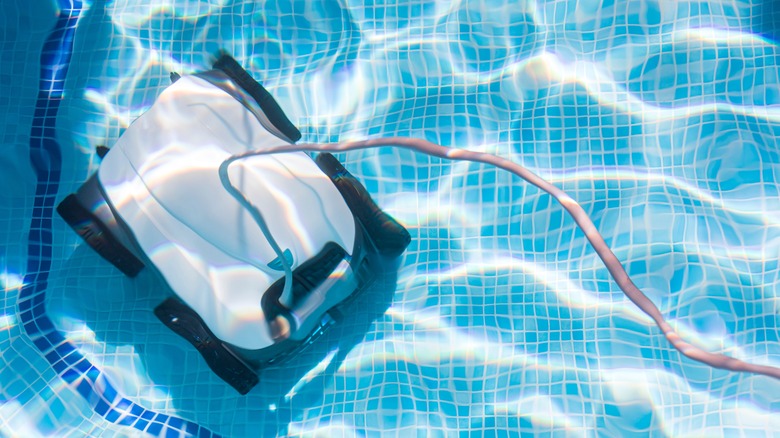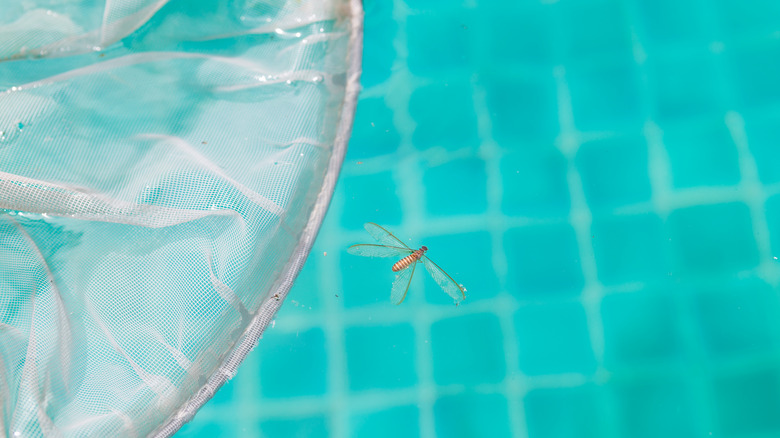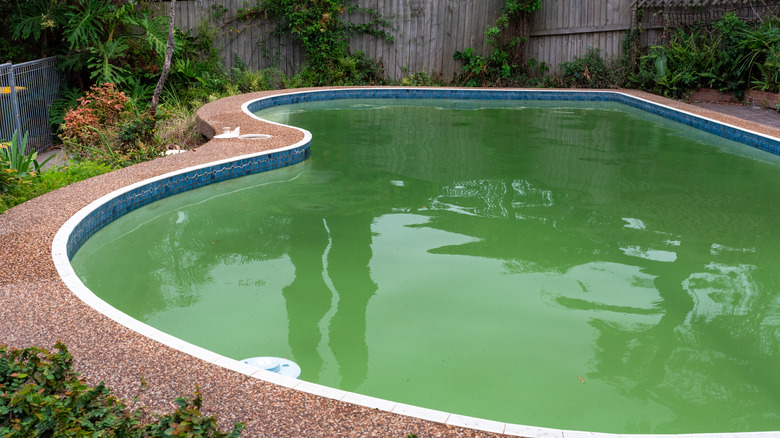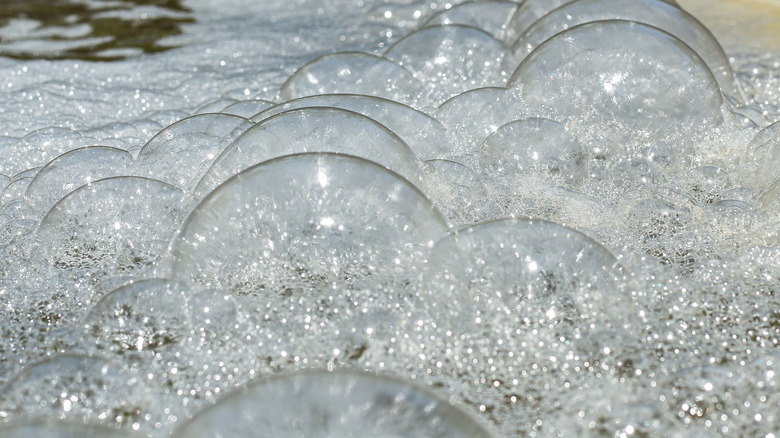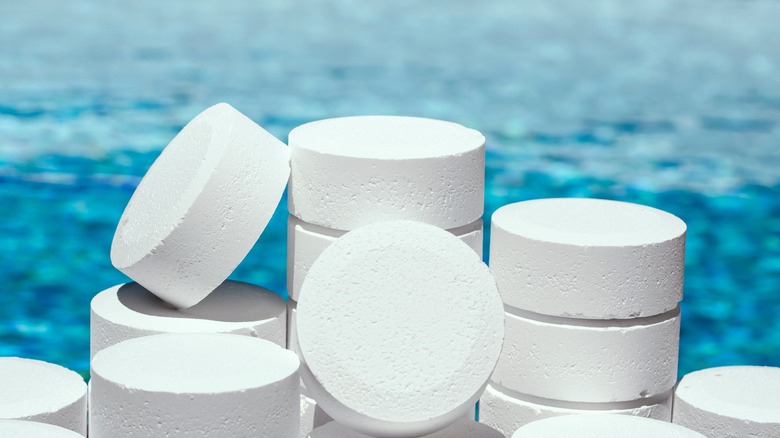Signs That Your Pool Is In Dire Need Of A Cleaning
If you want to reap the benefits of having a pool, you will have to maintain it properly. That means cleaning your pool and keeping it clean is the only way to ensure a safe and enjoyable swimming experience. Neglecting basic routine upkeep can result in algae, mosquito larvae, and harmful bacteria growth. It's relatively easy to spot a pool that needs some help. Strong odors, including chlorine, cloudy water, and itchy skin, all point to a pool that's in dire need of a cleaning.
Weekly maintenance is essential and should be done by regularly monitoring the water at least twice weekly using special water test strips. Proper chlorination keeps bacteria from blooming and overtaking your watery refuge. This includes cleaning out the filter so that it continues to keep the water clean. Running the pool pump for the recommended duration also ensures proper water circulation and filtration. If you skimp on the most basic maintenance practices, you will pay for it with your health. Aside from red and itchy skin and eyes, you could risk exposure to bacteria like E. coli. You also put yourself and your loved ones at risk for developing diarrhea, swimmers ear, and hepatitis A. That's a high price for a few minutes of your day and some elbow grease.
You have pests and floaters
Unclean and-or stagnant pool water can create an ideal environment not just for algae and bacteria. Other lifeforms, like mosquito larvae, beetles, and other insects, all find your pool a great place to hang out, reproduce, and make a mess of things. These pests are attracted to pools with imbalanced water and a buildup of algae, so if the water chemistry isn't properly balanced, you can expect more than a few nasty party crashers.
If you start noticing an increased presence of bugs in your pool, that clearly indicates that you need to take immediate action. Mosquito larvae find stagnant water a perfect breeding ground, while beetles and other insects are attracted to the nutrients and shelter an unbalanced environment provides. Testing and adjusting the chemical levels consistently help maintain proper water balance, minimizing the chances of bacteria, algae, and pest infestations.
The water is cloudy or discolored
If you're unable to see your feet in the shallow end of the pool, it's a clear indication of a serious problem. Hopefully, nothing is lurking down there, either. Cloudiness or murkiness in the water means there's an imbalance of chemicals, which a few different factors can cause. Bacteria, foreign contaminants, low chlorine levels, improper filtration, poor circulation, or even the aftermath of a rainstorm can all be contributed to murky and questionable water. If your water is turning green or developing a yellowish-brown color, it shows algae growth. It doesn't have to be slime-green or mud-brown water, either. Even the slightest discoloration is a good enough reason for a thorough cleaning.
If your pool water appears cloudy, this could be caused by a lack of sunlight, heavy rain, a chemical imbalance, or an issue with your pool filter. A certified pool technician can determine the reason for water discoloration to prevent the problem in the future.
There's a visible layer of foam or scaling
If you've noticed the formation of bubbles on the pool surface or foam gathering along the water's edge, it's more than just gross. It could indicate underlying issues that require attention. Bubbles that persist without popping or the presence of foam may be caused by a clogged filter, bacteria buildup, or contaminants in the water, like sunscreen. This buildup creates a layer of frothy bubbles in the water, indicating an overload of pollutants and a high concentration of bacteria. Clogged pool filters can also contribute to the development of foam. Checking the water chemistry is important because bubbles can indicate a pH imbalance.
If your swimming pool has developed stains or scaling on the walls and tiles that are resistant to brushing or using a pumice stone, you might want to get it deep cleaned. Stains and scaling are often caused by calcium buildup, which can give your pool a gritty, gray texture. Dealing with scaling and staining can be challenging, especially in severe cases that may require complete resurfacing.
Your skin gets super itchy
While it's normal to sometimes deal with red eyes after exposure to pool water, experiencing itchy skin and red eyes after swimming in a pool can be a sign that the pool needs some help. Various factors, including high levels of chlorine or other chemicals in the water, can cause itchy skin. Similarly, red eyes are often attributed to irritation from chlorine or chloramines, which are formed when chlorine combines with organic matter in the pool.
Routine cleaning and maintenance should include skimming, vacuuming, and backwashing the filter, all of which help remove debris and prevent the buildup of contaminants. Testing the water chemistry, specifically checking chlorine levels, pH balance, and total alkalinity, is crucial to maintaining a healthy and balanced pool environment. Adjusting the chemical levels and providing adequate filtration and circulation can also help alleviate skin and eye irritation. To treat a chlorine rash, use over-the-counter products like hydrocortisone cream or diphenhydramine, and avoid highly perfumed lotions. There are also chlorine removal body washes and lotions available.
It smells like chlorine
If your pool consistently smells like it's filled with chlorine and not water, this is due to an overabundance of chloramines. These chemical compounds form when chlorine disinfectants react with organic substances like sweat, sunscreen, skin cells, and bodily fluids. Unlike the chlorine you add to your pool (free chlorine), chloramines do not have the magical ability to cleanse and sanitize. But what they do have is the ability to emit a strong and unpleasant chlorine odor. Contaminants present in the water, introduced by swimmers and environmental factors, continuously contribute to the formation of chloramines. That's one of the many reasons why it's important to clean your pool.
Chloramines produce an unpleasant odor and cause eye and skin irritation, but they also get in the way of free chlorine sanitizing. To fix this problem, you'll want to add a substantial amount of chlorine to the pool. This is known as shocking the pool. Shocking the pool eliminates chloramines and oxidizes other harmful contaminants, thus effectively disinfecting and sterilizing the pool water.
